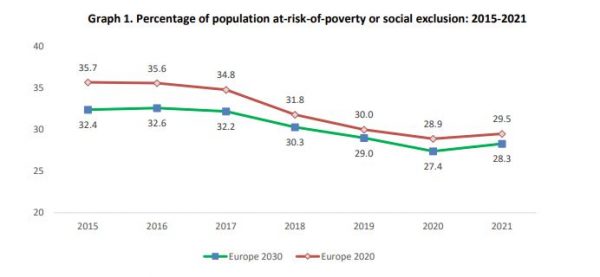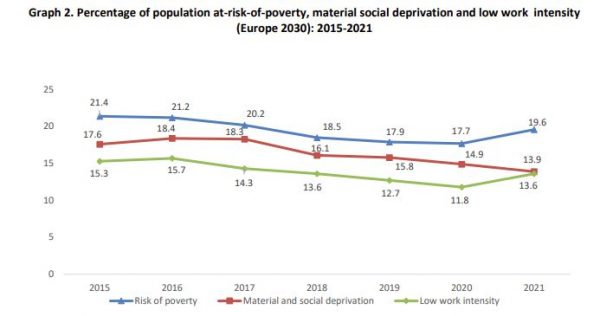
The number of citizens in Greece who are faced with the risk of poverty has increased.
In particular, 28.3% of the country’s population is at risk of poverty or social exclusion in 2021, showing an increase of 0.9% compared to 2020, according to the official data of Hellenic Statistical Authority ELSTAT.
Also, 6.9% of households said their income increased over the past twelve months, while 26.3% of households said it decreased and 66.7% of households said it remained the same.

Based on the data of the 2021 Household Income and Living Conditions Survey, the population at risk of poverty or social exclusion, according to the revised definition (the target set in social protection by the European Pillar of Social Rights Action Plan “EU 2030 targets” is: ‘The number of people at risk of poverty or social exclusion should be reduced by at least 15 million, out of them, at least 5 million should be children’ by 2030), amounts to 28.3% of the country’s population (2,971,200 people), showing an increase compared to 2020 by 0.9 percentage points.
Based on the initial definition (the “Europe 2020” program had set the target of reducing poverty by ‘lifting at least 20 million people out of the risk of poverty and social exclusion’ by 2020) of the above indicator, the population at risk of poverty or social exclusion amounts to 29.5% (3,092,300 people) of the country’s population, recording an increase compared to 2020 by 0.6 percentage points (2020: 28.9%).
What’s the reason
The increase in the percentage of the at-risk-of-poverty or social exclusion is due to the increase in the percentage of the population in low work intensity (from 11.8% in 2020 to 13.6% in 2021) and the population at risk of poverty from 17.7% in the year 2020 to 19.6% in the year 2021.

The risk of poverty or social exclusion is higher in the case of children aged 17 and under (32.0%). The percentage of the population aged 18-64 living in households with low work intensity is estimated at 13.6% of the total population of this age group, showing an increase of 1.8 percentage points compared to the year 2020. The percentage for men amounts to 12.5% and for women to 14.6%.
At risk-of-poverty rate and poverty threshold after social transfers
The poverty threshold amounted to 5,251 Euros per single person household annually and to 11,028 Euros for households with two adults and two dependent children under 14 years old. By definition, it is set at 60% of the median of the total equivalised disposable household income, which was estimated at 8,752 Euros, while the mean annual disposable income of the households of the country was estimated at 17,089 Euros.
In 2021, 19.6% of the total population was at risk of poverty registering an increase of 1.9 percentage points. This indicator amounted to 19.6% in 2005 (with income reference period 2004) and recorded an upward trend up to 2012 (23.1%), starting to decrease from 2014 onwards.
The households at risk-of-poverty amount to 765,372 out of a total of 4,108,895 households, and the members of these households amount to 2,054,015 out of a total of 10,498,099 persons which is the country’s estimated total population, living in private households.
Children in dire straits
The at-risk-of-poverty rate for children aged 0-17 years (child poverty) amounted to 23.7%, recording an increase of 2.8 percentage points compared to 2020, while for the population 18-64 years old and 65 years old and over is 20.6% (2020: 18.4%) and 13.5% (2020: 13.0%), respectively.
The at-risk-of-poverty rate, using thresholds different than 60% of the median of the total equivalent disposable household income, amounts to:
- 8.3%, when the risk of poverty threshold is defined at 40% of the median of the total equivalent disposable household income,
- 13.3%, when the risk of poverty threshold is defined at 50% of the median of the total equivalent disposable household income and,
- 26.7%, when the risk of poverty threshold is defined at 70% of the median of the total equivalent disposable household income, respectively.
In three (3) Regions (Attiki, Kriti and Notio Aigaio) the at-risk-of-poverty rate is lower than that of the Country total, while in the remaining ten (10) Regions (Thessalia, Ionia Nisia, Ipeiros, Voreio Aigaio, Dytiki Ellada, Peloponnisos, Dytiki Makedonia, Sterea Ellada, Kentriki Makedonia and Anatoliki Makedonia and Thraki) the corresponding percentages are higher.
Characteristics of at-risk-of-poverty population
In 2021, the at-risk-of-poverty rate is slightly higher for females (19.8%) compared to that of males (19.4%).
The at-risk-of-poverty rate for males and females increased by 1.9 and 2.0 percentage points respectively.
The at-risk-of-poverty rate for persons aged 65 years and over amounted to 15.6% for women and to 11.0% for men.
The at-risk-of-poverty rate for persons aged 75 years and over amounted to 14.0%, while for persons under 75 years old to 20.2%
Employed persons over 18 years face a lower risk-of-poverty compared to unemployed or economically inactive persons (housewives, etc). The at-risk-of-poverty rate for employed persons over 18 years amounts to 11.3% increasing by 1.2 percentage points compared to 2020. An increase was recorded for employed women over 18 years, by 1.6 percentage points, while for employed men an increase was recorded by 0.9 percentage points, with the respective percentages at 8.8% and 13.0%.
For unemployed persons, as already mentioned, the at-risk-of-poverty rate is significantly higher and amounts to 45.4% showing a significant difference between males and females (54.3% and 38.6% respectively). The at-risk-of-poverty rate for economically inactive persons (excluding pensioners) increased by 2.2 percentage points and it was estimated at 27.3%.
Evolution of household income
6.9% of households declared that their income has increased in the last 12 months, while for 26.3% of households it decreased, and for 66.7% of households it remained the same. 23.7% of households declared that the main reason for the increase or decrease of income was the COVID-19 pandemic, of which 3.4% stated that their income increased and 20.4% that it decreased. The average equivalent income per person reached 9,952 Euros, decreased by 0.9% as compared to that recorded in the previous year.
Latest News

German Ambassador to Greece Talks Ukraine, Rise of Far Right & Tariffs at Delphi Economic Forum X
Commenting on the political developments in his country, the German Ambassador stressed that it was clear the rapid formation of a new government was imperative, as the expectations across Europe showed.

Athens to Return Confiscated License Plates Ahead of Easter Holiday
Cases involving court orders will also be excluded from this measure.

Servicers: How More Properties Could Enter the Greek Market
Buying or renting a home is out of reach for many in Greece. Servicers propose faster processes and incentives to boost property supply and ease the housing crisis.

Greek Easter 2025: Price Hikes on Lamb, Eggs & Sweets
According to the Greek Consumers’ Institute, hosting an Easter dinner for eight now costs approximately €361.95 — an increase of €11 compared to 2024.

FM Gerapetritis Calls for Unified EU Response to Global Crises at EU Council
"Europe is navigating through unprecedented crises — wars, humanitarian disasters, climate emergencies," he stated.

Holy Week Store Hours in Greece
Retail stores across Greece are now operating on extended holiday hours for Holy Week, following their Sunday opening on April 13. The move aims to accommodate consumers ahead of Easter, but merchants remain cautious amid sluggish market activity.

Green Getaway Ideas for Easter 2025 in Greece
Celebrate Easter 2025 in Greece the sustainable way with eco-farms, car-free islands, and family-friendly getaways rooted in nature and tradition.

Civil Protection Minister Details Summer Firefighting Plans at Delphi Forum
At the 10th Delphi Economic Forum, Minister of Climate Crisis and Civil Protection Yiannis Kefalogiannis discussed Greece's plans for the upcoming fire season.

How Shops and Markets Will Operate During Easter Holy Week
The Easter holiday schedule has been in effect since April 10, with retail stores open Palm Sunday, and most supermarkets also operating to meet consumer demand for Easter shopping

Why Is the French Aircraft Carrier Charles De Gaulle in Piraeus?
Docking in Piraeus after a four-month deployment in the Indo-Pacific region, the admiral of the aircraft carrier the Charles de Gaulle says, "Greece is our best partner in the Mediterranean."








































 Αριθμός Πιστοποίησης
Αριθμός Πιστοποίησης